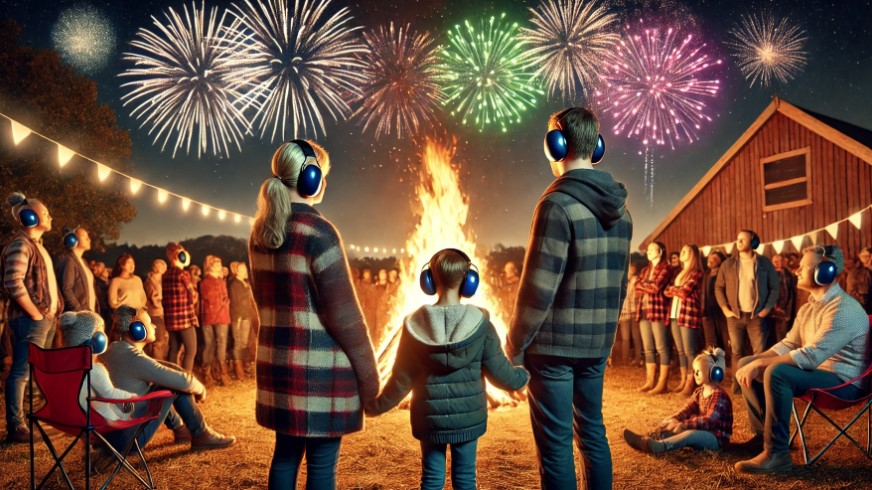Bonfire Night on 5th November is an evening to look forward to—filled with dazzling fireworks, crackling bonfires, and joyful cheers. But while we’re celebrating, it’s also essential to think about our hearing health. Some of the bangs from fireworks can reach noise levels of up to peaks of 150 decibels, which is well above the safe Exposure Limit Value of 140 dBC for ‘one off’ bangs and contributes to the overall personal noise exposure across the evening exceeding 85dBA, at which hearing damage can start to occur. By taking a few precautions, you can enjoy the sights and sounds of Bonfire Night without putting your ears at risk.
1. Keep a Safe Distance.
- Fireworks and bonfires are best enjoyed from a distance. Aim to stay at least 15–20 meters from loud fireworks. Not only will this give you a broader view of the display, but it will also reduce the impact of high noise levels on your ears.
2. Wear Ear Protection
- Earplugs or Earmuffs are effective at reducing the intensity of loud noises while still being able to enjoy them.
- Disposable earplugs are inexpensive and easy to carry, but you do need to make sure you fit them properly to be effective.
- Reusable plugs are available with various levels of sound protection. NB: These can be washed but may not last until the following year so check any information they come with.
- Ear Defenders also called Ear Muffs are more visible but are easier to fit, reusable and can have the added benefit of keeping your ears warm if it is a chilly night. Make sure the soft cup fits well against your head to create a good seal, moving hair or jewellery out of the way. Do not wear them over a hood or hat.
3. Mind the Volume for Kids
- Children are particularly vulnerable to loud noises, so ensure they’re protected too.
- Plugs will not sit or stay in children’s ears so opt for earmuffs designed specifically for children, as they are smaller more comfortable and offer excellent protection for little ears.
- Using adult sized ear defenders will not provide any protection to children, the size and tension of the band will not hold the cups firm enough to the side of the head and the cups are too large will so gaps will be present under the ear near the jaw.
4. Limit Your Time Near the Noise
- Try not to stay in very noisy areas for long periods. The longer you’re exposed to high-decibel sounds, the greater the chance of hearing damage. Enjoy the fireworks but take breaks in quieter spots when you can.
5. Be Aware of Delayed Symptoms
- After a noisy event like this, some people experience symptoms like ringing in the ears (tinnitus) or a feeling of muffled hearing. This is not your ears ‘getting used to the noise’ but can be signs of noise-induced hearing damage, even if temporary. If these symptoms persist, it’s wise to consult a hearing specialist.
6. Choose the Right Viewing Spot
- Parks or large open spaces often allow people to spread out, providing natural buffers against sound waves. Try to position yourself in a place where you can see the display without being too close to where the fireworks are set off. This can be handy for the ‘grand finale’ where you will get a spectacular view but be close to the carpark or exit and avoid the bottleneck at the end.
Final Thoughts
Bonfire Night is a wonderful occasion to spend with family and friends, and with a little preparation, you can ensure it’s a safe one for your hearing. By following these tips, you’ll protect your ears while enjoying all the sights, sounds, and magic of 5th November to the fullest.
For information noise hearing protection, Earplug Fit Tests or Testing your hearing contact us at info@uk-nvs.com

